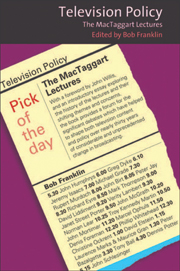Book contents
- Frontmatter
- Contents
- Acknowledgements
- Foreword
- Introduction
- The James MacTaggart Lectures
- TV Drama: The Case against Naturalism
- Naturalism and Television
- Taboos in Television
- Signposting Television in the 1980s: The Fourth Television Channel
- Television Drama, Censorship and the Truth
- The Day after Tomorrow: The Future of Electronic Publishing
- The Primacy of Programmes in the Future of Broadcasting
- Reflections on Working in Film and Television
- ‘Opening up the Fourth Front’: Micro Drama and the Rejection of Naturalism
- Power and Pluralism in Broadcasting
- Ethics, Broadcasting and Change: The French Experience
- Freedom in Broadcasting
- Deregulation and Quality Television
- The Future of Television: Market Forces and Social Values
- The Future of the BBC
- Occupying Powers
- A Culture of Dependency: Power, Politics and Broadcasters
- Talent versus Television
- A Glorious Future: Quality Broadcasting in the Digital Age
- Rewarding Creative Talent: The Struggle of the Independents
- Television versus the People
- Public-Interest Broadcasting: A New Approach
- A Time for Change
- The Soul of British Television
- Television's Creative Deficit
- Freedom of Choice: Public-Service Broadcasting and the BBC
- First Do No Harm
- Appendix A Edinburgh International Television Festival, 29 August–2 September 1977: Programme
- Appendix B Précis of Ted Turner, James MacTaggart Lecture 1982; Dr Jonathan Miller, James MacTaggart Lecture 1983
- Index
Rewarding Creative Talent: The Struggle of the Independents
from The James MacTaggart Lectures
Published online by Cambridge University Press: 05 August 2013
- Frontmatter
- Contents
- Acknowledgements
- Foreword
- Introduction
- The James MacTaggart Lectures
- TV Drama: The Case against Naturalism
- Naturalism and Television
- Taboos in Television
- Signposting Television in the 1980s: The Fourth Television Channel
- Television Drama, Censorship and the Truth
- The Day after Tomorrow: The Future of Electronic Publishing
- The Primacy of Programmes in the Future of Broadcasting
- Reflections on Working in Film and Television
- ‘Opening up the Fourth Front’: Micro Drama and the Rejection of Naturalism
- Power and Pluralism in Broadcasting
- Ethics, Broadcasting and Change: The French Experience
- Freedom in Broadcasting
- Deregulation and Quality Television
- The Future of Television: Market Forces and Social Values
- The Future of the BBC
- Occupying Powers
- A Culture of Dependency: Power, Politics and Broadcasters
- Talent versus Television
- A Glorious Future: Quality Broadcasting in the Digital Age
- Rewarding Creative Talent: The Struggle of the Independents
- Television versus the People
- Public-Interest Broadcasting: A New Approach
- A Time for Change
- The Soul of British Television
- Television's Creative Deficit
- Freedom of Choice: Public-Service Broadcasting and the BBC
- First Do No Harm
- Appendix A Edinburgh International Television Festival, 29 August–2 September 1977: Programme
- Appendix B Précis of Ted Turner, James MacTaggart Lecture 1982; Dr Jonathan Miller, James MacTaggart Lecture 1983
- Index
Summary
The theme of Laurence Marks and Maurice Gran's lecture is the relative powerlessness of the creative workers (writers, producers and directors) – ‘the talent’ – in television and the other creative industries. Establishing an independent production company provides writers with creative control over their work but even independent producers can end up being treated as little more than ‘a glorified freelance at the mercy of the market’ without ownership and distribution rights over programmes. It is still preferable, however, to working directly for a broadcaster such as the BBC or ITV which often involves being ‘under-respected, under-consulted, [and] under-rewarded’.
In 1989 Marks and Gran established their production company Alomo: their programme credits include Birds of a Feather, Love Hurts and Goodnight Sweetheart. The BBC remains the most important customer for talent, but its attitude towards independent producers remains ‘essentially patronising’ preferring to ‘concentrate their cash, care and chauffeur-driven cars on the front-of-camera talent, soap stars and celebrity chefs’: both the BBC and ITV ‘betray the behind-the-camera talent’. Channel 4 is little better. A creatively liberating partner, Channel 4 drives ‘some of the hardest and cruellest bargains financially’.
At the BBC the problem reflects the fact that creative leaders and their ability to commission work have been undermined by ‘legions of lawyers … and policy unit apparatchiks’. These new ‘gatekeepers’ have little enthusiasm or interest in programming and apply to television ‘the same discipline they would apply to the production of biscuits … Like the Hitler Youth they know no other system.’
- Type
- Chapter
- Information
- Television PolicyThe MacTaggart Lectures, pp. 201 - 210Publisher: Edinburgh University PressPrint publication year: 2005

